Mark Anthony Neal's Blog, page 474
February 16, 2018
New Yorker Radio Hour -- Ava DuVernay in Conversation with Jelani Cobb
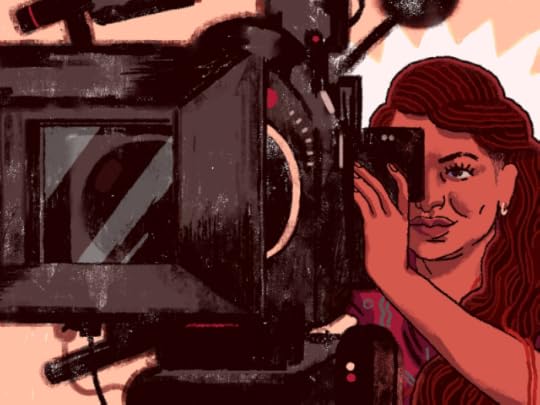 'No film adaptation of A Wrinkle In Time, Madeleine L’Engle’s beloved, and often banned, children’s book, published in 1962, has ever made it to American movie theaters. It finally comes to the screen with a cast that includes Oprah Winfrey and Reese Witherspoon. The director is Ava DuVernay, who wasn’t the obvious choice for a metaphysical fantasy epic. Best known for Selma, about the 1965 civil-rights march, DuVernay also made the documentary 13, about the prison system, and the TV series Queen Sugar. But DuVernay tells New Yorker staff writer Jelani Cobb that she relished the opportunity to create a fantasy film. “You’re seeing worlds built through the point of view of a black woman from Compton,” she says. “So when I’m told, ‘Create a planet,’ my planet’s going to look different from my white male counterpart’s planet”—which is what Hollywood shows us “ninety-seven per cent of the time.”'
'No film adaptation of A Wrinkle In Time, Madeleine L’Engle’s beloved, and often banned, children’s book, published in 1962, has ever made it to American movie theaters. It finally comes to the screen with a cast that includes Oprah Winfrey and Reese Witherspoon. The director is Ava DuVernay, who wasn’t the obvious choice for a metaphysical fantasy epic. Best known for Selma, about the 1965 civil-rights march, DuVernay also made the documentary 13, about the prison system, and the TV series Queen Sugar. But DuVernay tells New Yorker staff writer Jelani Cobb that she relished the opportunity to create a fantasy film. “You’re seeing worlds built through the point of view of a black woman from Compton,” she says. “So when I’m told, ‘Create a planet,’ my planet’s going to look different from my white male counterpart’s planet”—which is what Hollywood shows us “ninety-seven per cent of the time.”'
Published on February 16, 2018 20:03
Reading The Reckoning: Morgan Jerkins
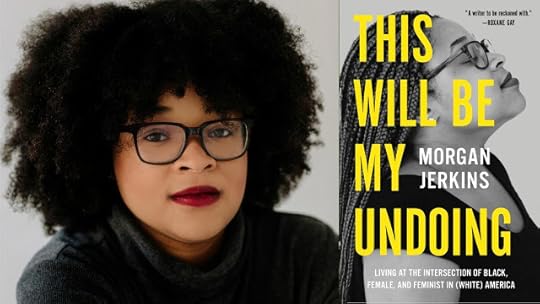 'In week two of the book club series, Reading The Reckoning with Rebecca Carroll, this week's book is a collection of essays by
Morgan Jerkins
called,
This Will Be My Undoing
. This New York Times best seller takes on a central question: What does it mean to “be” — to live as, to exist as — a black woman today?' -- The Takeaway
'In week two of the book club series, Reading The Reckoning with Rebecca Carroll, this week's book is a collection of essays by
Morgan Jerkins
called,
This Will Be My Undoing
. This New York Times best seller takes on a central question: What does it mean to “be” — to live as, to exist as — a black woman today?' -- The Takeaway
Published on February 16, 2018 19:51
The Information Weapon: Why the Internet was Always Spying on You
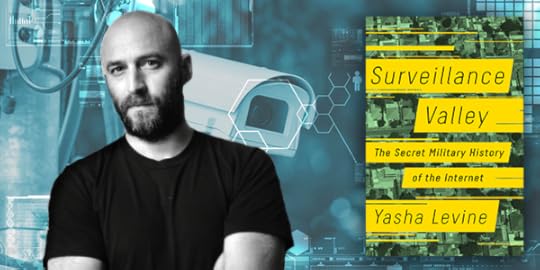 'Investigative journalist Yasha Levine explains why the internet has been a surveillance tool since day one - as a Cold War project to monitor populations pushing back against the militarization of society, and as the synthesis of corporate and state power in service of protecting the interests of the ruling class - yesterday, today and tomorrow. Levine is author of the new book Surveillance Valley: The Secret Military History of the Internet from PublicAffairs.' --
This is Hell! Radio
'Investigative journalist Yasha Levine explains why the internet has been a surveillance tool since day one - as a Cold War project to monitor populations pushing back against the militarization of society, and as the synthesis of corporate and state power in service of protecting the interests of the ruling class - yesterday, today and tomorrow. Levine is author of the new book Surveillance Valley: The Secret Military History of the Internet from PublicAffairs.' --
This is Hell! Radio
Published on February 16, 2018 19:27
Redefining American Marriage in the Shadow of American Incarceration: A Conversation with Tayari Jones
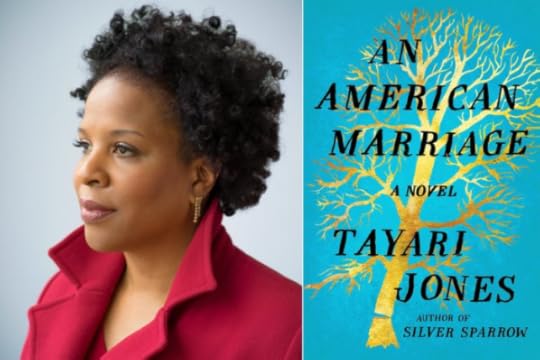
'In a conversation with Isaac Fitzgerald, founding editor of Buzzfeed Books and co-host of Twitter Morning Show, #AmtoDM, Tayari Jones talks about her writing process, her relationships with her characters, and what it felt like to get an unannounced call from Oprah herself. Inspired by her research into the painful realities of American incarceration, Jones’ An American Marriage blends equal parts heartbreak and humor to tell the love story of a young couple whose marriage is tested by an unexpected calamity.'
Published on February 16, 2018 19:07
Black Liberation and the Crisis of Capital: A Conversation with Abdul Alkalimat
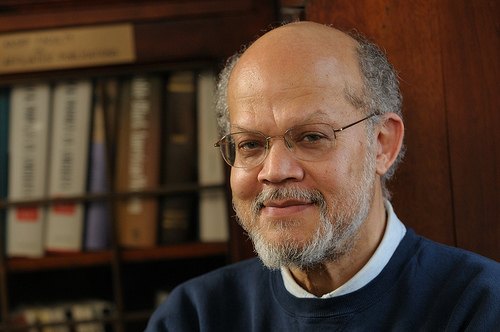 'Abdul Alkalimat, Professor Emeritus of African-American Studies and Information Sciences, joins the New Dawn Podcast and host Michael C. Dawson, and discusses the role of Black intellectuals and their relationships with liberation movements.'
'Abdul Alkalimat, Professor Emeritus of African-American Studies and Information Sciences, joins the New Dawn Podcast and host Michael C. Dawson, and discusses the role of Black intellectuals and their relationships with liberation movements.'
Published on February 16, 2018 18:48
What Else Happened? Omisade Burney-Scott Discusses a Bold North Carolina Campaign to End Shackling of Pregnant People
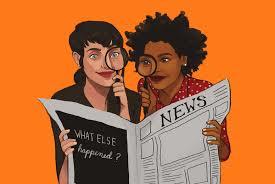 'In the latest episode of What Else Happened?, Rewire managing editors Regina Mahone and Kat Jercich discuss what the Trump administration is–and isn’t–doing to address domestic violence, how rural communities are disproportionately affected by toxic drinking water, and about the Catholic health systems looking to get into the drug business. Also, Kat talks with SisterSong’s Omisade Burney-Scott about a campaign to end the practice of shackling pregnant people in North Carolina prisons.'
'In the latest episode of What Else Happened?, Rewire managing editors Regina Mahone and Kat Jercich discuss what the Trump administration is–and isn’t–doing to address domestic violence, how rural communities are disproportionately affected by toxic drinking water, and about the Catholic health systems looking to get into the drug business. Also, Kat talks with SisterSong’s Omisade Burney-Scott about a campaign to end the practice of shackling pregnant people in North Carolina prisons.'
Published on February 16, 2018 18:40
February 15, 2018
Black Panther Double Sided Review: on White People, Marvel, and Black Storytelling -- by Stephane Dunn
 Black Panther Double Sided Review: on White People, Marvel, and Black Storytelling
by Stephane Dunn | @DrStephaneDunn | NewBlackMan (in Exile)
Black Panther Double Sided Review: on White People, Marvel, and Black Storytelling
by Stephane Dunn | @DrStephaneDunn | NewBlackMan (in Exile)I’ve been waiting to be going to see Black Panther at the movies a lifetime, not hyperbole, just straight up truth. I go with my son, and when the lights darken, and royal purple, deep blues, and dazzling reds on ebony and mahogany skin jump off the screen, I’m one of several thousand exhaling and grinning like I never see a movie or a superhero in a movie.
At the end of the movie, when the requisite flicks to come teasers fade into a million credits, and my son’s tap dancing excitedly beside me watching folk take souvenir Black Panther pics, I’m in a strange soft light afterglow. Black Panther is absolutely the best-looking film in the Marvel movie universe, the best looking among the superhero movies period. It is historically and culturally the most important and impactful superhero flick perhaps ever. It even dares to glimpse the women, Black women, as forces of physical power, skill, and scientific and technological brilliance and the latter in the figure of a Black girl who rocks.
Director-screenwriter Ryan Coogler and co-screenwriter Joe Robert Cole saw there had to be humor and that we and the Black lives matter times demand a Black Panther superhero movie that revels in being Black and proud. Hence, there is a double conscious sensitivity towards the White male presence; it tries to avoid falling prey to traditional Hollywood’s love for having a good heroic White guy taking center stage.
Meanwhile, there is a superhero fierceness so radical, hot, and revolutionary, it evidently can’t be imagined by mere mortal men dreaming up fantastic male and White female superheroes with brown hued sister soldiers but legions of us can. We see you sistas – Storm-esque and Wakandian baaadaasss sexy, strong, wise -- unlikely revolutionaries come to save – I gotta a superhero fit line ready, ‘You see how long it took them to discover we are earth, they have no idea we are fire and sky.’
I am driving after dropping my son at school, double sided and writing in my head, love and disturbance. I’m tuning in and out of radio channels hoping for a song I love and haven’t heard in a while and instead:
White Guy 1:‘Just make a movie and not have an agenda, that’s all I’m sayin’ Don’t get into the race thing.White Guy 2: ‘You feel it’s being politicized?White Guy 1: Yeah, yeah. That guy Jordan’s on some magazine cover…wearing a black panthers uniform…Better uniforms than the Klan though…I’m just sayin’, it’s a superhero movie. Leave the politics.
I’m pumping breaks, a bit amused but mostly not– I’m woke and get to talking back to White Guy #1 as I go through the next five lights. Superhero comics have been political centric from the beginning. Bad guys, countries at war, capitalist corruption, political ideologies in combat, genocide government control, weapons of mass destruction - Did you watch Captain America: Civil War - Winter Soldier, Any of the Avengers, Iron Man?
What you really mean is why can’t ‘Black’ Panther be less ‘Black’? Couldn’t it avoid direct or allegorical reference to topics icky to sensitive white people, including Western colonialism, exploitation, and genocide in Africa, racism, and so forth and instead deliver black folk running around in cool futuristic suits merely jousting with supernatural spears
No.
One week later to the day of seeing the movie, I am not thinking about White guy but about how I am still paused on the page with so much on my mind about Black Panther. I am hitting the brakes, tapping the radio arrow, and it’s the same byte from sports talk to right wing to jazz to hip hop morning shows - ‘seventeen dead’ ‘assault rifle’ ‘disturbed boy’ and Black Panther is opening nationwide.
At a red light, I squeeze the steering wheel with both hands. It comes to me again how our deepest real stuff and imagination fuel superhero comics and movies. The fragility of safety, the longing for it and whether it is real and sustainable internally; whether being safe and at peace as a state of civilized being is possible for the world community – that is at the heart of the film.
Black Panther was sold before the presales even began; we already loved it upon announcement that it was getting made. It hits so terrifically on some dazzling levels that viewers will sleep on the story problems. It would have been incredible for the movie to be what it absolutely could have been - kick ass marvelous in every way.
That most basic element, the story and its development, this is where Black Panther is lesser than it should be. It is in the knitting together of the story’s details – the neglected nuances of motivation and contradiction, the missed opportunities to complicate and contradict the hell out of the choices the key and secondary characters make and why -- most glaringly in the case of the dead King, T'Challa's father, and his foe, the cousin (Michael B. Jordan). T'Challa and his long-lost cousin get no slow dance into epic battle; the pacing rushes towards the ‘big’ moments, no stroking tensions, a little waiting and intensification.
A sure-footed story could trust us to be interested in seeing what Boseman could do with T'Challa in the wilderness unstrung, weakened dramatically, having to earn his way back to be worthy to challenge. The talented Jordan’s performance, psychopath or not, is reduced overly much to a series of angry Black Power-centric utterances. We get it logically; he’s orphaned and wronged by his dead uncle, the late King, but there’s no kick in the gut level, if some contradictions could have interrupted Do we need convincing that this cousin is a fit Black Panther villain or that Jordan is right for the role of one?
Black Panther rushes elsewhere too. Wakanda is an advanced society, superior knowledge and civilization rooted in an Afrocentric communal spiritualism. A single physical battle and a stop by the ancestors, and one is worthy to be King; No counsel of the elder women and men bothers to contemplate seriously the fate of Wakanda and the universe?
As a film, Black Panther fills a seemingly endless hole, the yearning still for dignified super baaad us on screen, but we should not perpetually ride on being invited to the party – Marvel’s or any other exclusive studio. Our legacy and cultural impact in film is no novelty now. We can get over being excited at being present, and how we take for granted how bold, diverse, and economically successful in cinema we have been and can be.
Now let’s show off the intricacies of our Afro-futuristic intellectual genius, the tunnel deep caverns of our linguistic majesty. Let our stories be brilliant from page to looks on screen and as big as our cultural imagination can hold. Let the sister-elders speak and bless, philosophize, and testify truth to power. Let us linger in the nuances of a layered story threaded through nimble, patient fingers and eyes. Black Panther is special for all the aforementioned, but better treatment of the story should follow.
+++
Stephane Dunn is a writer and professor and the director of the Morehouse College Cinema, Television, & Emerging Media Studies Program (CTEMS). Her publications include the 2008 book Baad Bitches & Sassy Supermamas: Black Power Action Films(U of Illinois) and a number of articles in mediums such as Ebony.com, The Atlantic, The Root.com, Bright Lights Film journal, and others. Follow her on Twitter at twitter @DrStephaneDunn and www.stephanedunn.com.
Published on February 15, 2018 20:51
February 14, 2018
The 'Soul of A Nation' Listening Sessions: Mark Anthony Neal @ Crystal Bridges
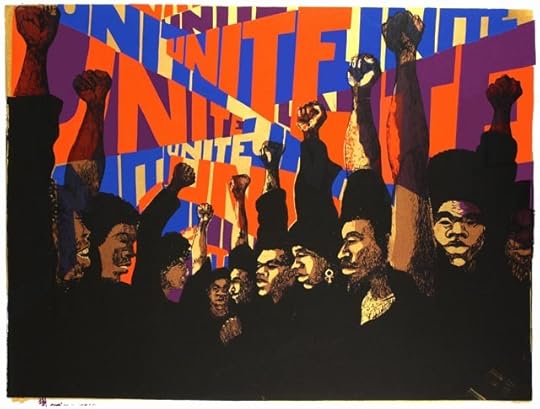 BARBARA JONES-HOGU, UNITE, 1971. © THE ARTIST.
BARBARA JONES-HOGU, UNITE, 1971. © THE ARTIST. Duke University Professor Mark Anthony Neal will curate a series of Listening Sessions in support of the US debut of Soul of a Nation: Art in the Age of Black Power at Crystal Bridges: Museum of American Art (February 3 - April 23, 2018).
Developed by the Tate Modern in London, Soul of a Nation: Art in the Age of Black Power examines the influences, including the civil rights movement, Minimalism, and abstraction, on artists such as Romare Bearden, Noah Purifoy, Martin Puryear, Faith Ringgold, Betye Saar, Alma Thomas, Charles White, and William T. Williams.
+++
Motown and “High Negro Style”Thursday, March 15, 2018 7pm
Crystal Bridges Museum of American Art600 Museum Way Bentonville, AR 72712
Neal discusses how the Motown sound became a template for style and Black middle class aspiration. Artists include: The Supremes, The Temptations, Marvin Gaye, Ashford + Simpson, The Four Tops
$15 ($12/members), register online or with Guest Services.
Love in the Stax: Death + Resurrection in MemphisThursday, March 22, 2018 7pm
Crystal Bridges Museum of American Art600 Museum Way Bentonville, AR 72712
Neal discusses how Stax, a Memphis-based white-owned label became the sound of Southern Soul, and how it rebuilt after the death of its signature artist Otis Redding, creating the template for Soul in the 1970s and ‘80s.
Artists include: Isaac Hayes, Otis Redding, The Staple Singers, David Porter, The Soul Children, Rance Allen, Shirley Brown
$15 ($12/members), register online or with Guest Services.
A Love Supreme: Jazz and the Pursuit of Black ExcellenceThursday, March 22, 2018 7pm
Crystal Bridges Museum of American Art600 Museum Way Bentonville, AR 72712
Neal discusses how the jazz scene of the 1960s coalesced around music, self-determination, and the pursuit of excellence as embodied in the music of John Coltrane.
Artists include: John Coltrane, Cannonball Adderley, Doug Carn, Pharoah Sanders, Abbey Lincoln, Gil Scott-Heron
$15 ($12/members), register online or with Guest Services. +++
Mark Anthony Neal is Professor of African and African American Studies, Chair of the Department of African and African American Studies, and the founding Director of the Center for Arts, Digital Culture, and Entrepreneurship (CADCE) at Duke University. He offers courses on Black Masculinity, Popular Culture, and Digital Humanities, including signature courses on Michael Jackson and the Black Performance Tradition, and The History of Hip-Hop, which he co-teaches with Grammy-award-winning producer 9th Wonder (Patrick Douthit).
Neal is the author of several books including What the Music Said: Black Popular Music and Black Public Culture (1999), Soul Babies: Black Popular Culture and the Post-Soul Aesthetic (2002), and Looking for Leroy: Illegible Black Masculinities (2013). The 10th anniversary edition of Neal’s New Black Man was published in February of 2015 by Routledge. Neal is co-editor of That’s the Joint: The Hip-Hop Studies Reader (Routledge), now in its second edition. Additionally, Neal hosts the video webcast Left of Black, which is produced in collaboration with the John Hope Franklin Center at Duke.
Published on February 14, 2018 06:51
February 11, 2018
Kali Akuno on Worker Cooperatives, Economic Democracy and Black Self-Determination
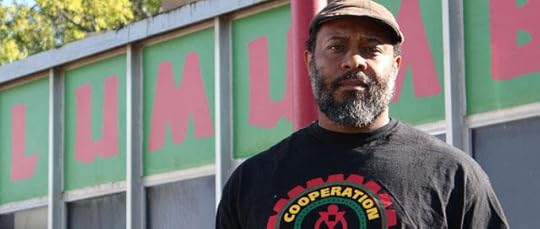 'In this episode,
Left Out
sat down with Kali Akuno — the co-founder and co-directer of
Cooperation Jackson
. They discuss the emerging network of worker-owned cooperatives and the people behind it building an alternative, solidarity-based economy inside the majority-black and impoverished city of Jackson, Mississippi.'
'In this episode,
Left Out
sat down with Kali Akuno — the co-founder and co-directer of
Cooperation Jackson
. They discuss the emerging network of worker-owned cooperatives and the people behind it building an alternative, solidarity-based economy inside the majority-black and impoverished city of Jackson, Mississippi.'
Published on February 11, 2018 13:39
Dee Rees And Mary J. Blige Dug Into Their Roots To Make 'Mudbound'
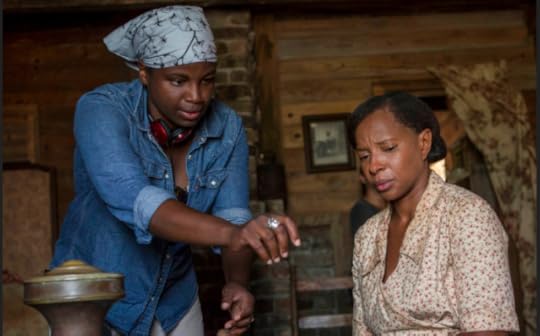 'Director Dee Rees and singer/actress Mary J. Blige both drew upon their families' history to make the Oscar-nominated film Mudbound. "I think I'm always exploring this idea about the battle being bloodier at home," Rees says.' --
NPR
'Director Dee Rees and singer/actress Mary J. Blige both drew upon their families' history to make the Oscar-nominated film Mudbound. "I think I'm always exploring this idea about the battle being bloodier at home," Rees says.' --
NPR
Published on February 11, 2018 13:30
Mark Anthony Neal's Blog
- Mark Anthony Neal's profile
- 30 followers
Mark Anthony Neal isn't a Goodreads Author
(yet),
but they
do have a blog,
so here are some recent posts imported from
their feed.



